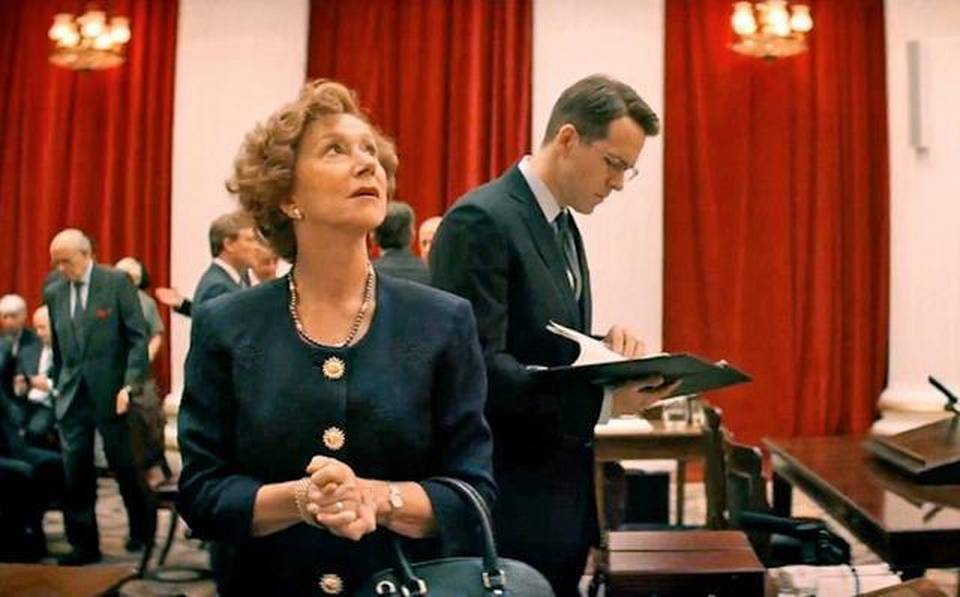Woman in Gold (2015)

“Portrait of Adele Bloch-Bauer I” is a painting by renown Viennese painter Gustav Klimt from 1907, reportedly taking over three years to complete. Klimt was hired for the portrait by Adele’s wealthy husband, Ferdinand, who later commissioned him to do another less-elaborate painting of her several years later. That painting, along with a great many other treasures, would be stolen by the invading Nazis in World War II, who renamed the portrait. “Woman in Gold”, to mask its Jewish origins. By the end of the war, the painting would end up residing in the Austrian State Gallery, where its popularity would soar, to the point where it would eventually be dubbed a masterpiece — “The Mona Lisa of Austria” — a source of great national pride.
Set starting in the late 1990s, Helen Mirren (RED 2, Monsters University) plays Maria Altmann, a Jewish-Austrian refugee living in Los Angeles as a boutique owner who is introduced to an up-and-coming lawyer son-of-a-friend named Randol Schoenberg (Reynolds, The Voices), who is hired to help her look through her recently late sister’s belongings that show that, being the niece of the aforementioned Adele (Traue, Seventh Son) , she may be the rightful heir to the portrait. With restitutions ongoing for victims of Nazi plundering, it’s off to court they go, but the odds seem insurmountable, given that the portrait is a rich national treasure, and the museum will fight tooth and nail before ever seeing it go out of the country. To prevail, Maria is going to have to reopen long-closed wounds by returning to Austria for the first time in 50 years to fight one more time for family honor.
The liberties-taking film employs a two-pronged approach to storytelling. One is of the various means through which the young Schoenberg has to deal with a difficult court battle, and an even more difficult and quite fickle client, and hopes to achieve success, to the point where he has put his family, career, and reputation on the line. The second is of telling the story of young Maria before and during World War II, and how much her family’s heritage means to her, especially given they were ripped away (both family and heritage) in one fell swoop. This back story provides most of the emotional components, and is very much needed to establish that Maria isn’t just in it for the money (at the time, the painting was said to be worth $100 million).
Woman in Gold is elevated from merely an average film to one that is worthwhile for those interested in the story through the quality of the acting. Though Mirren and Reynolds would seem a mismatched pair, their odd couple antics allow the casting to work well, and Reynolds is especially good as the weight of the case begins to weigh him down; you can sense his mounting frustration is liable to cause a nervous breakdown if it isn’t resolved is some form or fashion. Mirren is doing mostly a caricature, adopting the Austrian accent to compliment the French accent she gave in her previous role in The Hundred-Foot Journey, which doesn’t seem particularly authentic, but she brings so much life to the role, we’ll allow for a modicum of in-authenticity. It’s a people-pleasing kind of movie — genial and hard to dislike — but populist works, while enjoyable to experience, are often not the kind of thing one might confuse with high art.
Qwipster’s rating: B
MPAA Rated: PG-13 for some thematic elements and brief strong language
Running Time: 109 min.
Cast: Helen Mirren, Ryan Reynolds, Katie Holmes, Tatiana Maslany, Max Irons, Antje Traue, Daniel Bruhl, Charles Dance, Tom Schilling, Elizabeth McGovern, Allan Corduner
Small role: Frances Fisher, Jonathan Pryce, Moritz Bleibtreu
Director: Simon Curtis
Screenplay: Alexi Kaye Campbell
